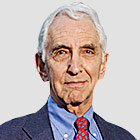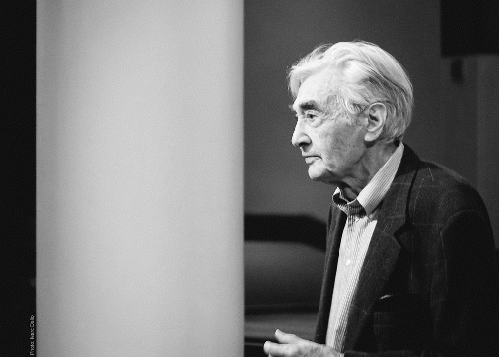From Truthdig
The renowned historian Howard Zinn died on January 27, 2010. On the occasion of the 10 year anniversary of his passing, we are revisiting the following piece by whistleblower Daniel Ellsberg about his close friend and "the best human being [he's] ever known," originally published on January 28, 2010.
I just learned that my friend Howard Zinn died today. Earlier this morning, I was being interviewed by the Boston Phoenix, in connection with the February release of a documentary in which he is featured prominently. The interviewer asked me who my own heroes were, and I had no hesitation in answering, first, "Howard Zinn."
Just weeks ago, after watching the film, I woke up thinking that I had never told him how much he meant to me. For once in my life, I acted on that thought in a timely way. I sent him an e-mail in which I said, among other things, what I had often told others: that he was, "in my opinion, the best human being I've ever known. The best example of what a human can be, and can do with their life."
Our first meeting was at Faneuil Hall in Boston in early 1971, where we both spoke against the indictments of Eqbal Ahmad and Phil Berrigan for "conspiring to kidnap Henry Kissinger." We marched with the rest of the crowd to make citizens' arrests at the Boston office of the FBI. Later that spring, we went with our affinity group (including Noam Chomsky, Cindy Fredericks, Marilyn Young, Mark Ptashne, Zelda Gamson, Fred Branfman and Mitch Goodman), to the May Day actions blocking traffic in Washington ("If they won't stop the war, we'll stop the government"). Howard tells that story in the film, and I tell it at greater length in my memoir, "Secrets: A Memoir of Vietnam and the Pentagon Papers." But for reasons of space, I had to cut out the next section in which Howard who had been arrested in D.C. after most of the rest of us had gone elsewhere, came back to Boston for a rally and a blockade of the Federal Building. I've never published that story, so here it is, an out-take from my manuscript:
A day later, Howard Zinn was the last speaker at a large rally in Boston Common. I was at the back of a huge crowd, listening to him over loudspeakers. Twenty-seven years later, I can remember some of what he said. "On May Day in Washington, thousands of us were arrested for disturbing the peace. But there is no peace. We were really arrested because we were disturbing the war."
He said, "If Thomas Jefferson and Alexander Hamilton had been walking the streets of Georgetown yesterday, they would have been arrested. Arrested for being young."
At the end of his comments, he said: "I want to speak now to some of the members of this audience, the plainclothes policemen among us, the military intelligence agents who are assigned to do surveillance. You are taking the part of secret police, spying on your fellow Americans. You should not be doing what you are doing. You should rethink it, and stop. You do not have to carry out orders that go against the grain of what it means to be an American."
Those last weren't his exact words, but that was the spirit of them. He was to pay for that comment the next day, when we were sitting side by side in a blockade of the Federal Building in Boston. We had a circle of people all the way around the building, shoulder to shoulder, so no one could get in or out except by stepping over us. Behind us were crowds of people with posters who were supporting us but who hadn't chosen to risk arrest. In front of us, keeping us from getting any closer to the main entrance to the building, was a line of policemen, with a large formation of police behind them. All the police had large plastic masks tilted back on their heads and they were carrying long black clubs, about four feet long, like large baseball bats. Later the lawyers told us that city police regulations outlawed the use of batons that long.
But at first the relations with the police were almost friendly. We sat down impudently at the very feet of the policemen who were guarding the entrance, filling in the line that disappeared around the sides until someone came from the rear of the building and announced over a bullhorn, "The blockade is complete. We've surrounded the building!" There was a cheer from the crowd behind us, and more people joined us in sitting until the circle was two or three deep.
We expected them to start arresting us, but for a while the police did nothing. They could have manhandled a passage through the line and kept it open for employees to go in or out, but for some reason they didn't. We thought maybe they really sympathized with our protest, and this was their way of joining in. As the morning wore on, people took apples and crackers and bottles of water out of their pockets and packs and shared them around, and they always offered some to the police standing in front of us. The police always refused, but they seemed to appreciate the offer.
Then one of the officers came over to Howard and said, "You're Professor Zinn, aren't you?" Howard said yes, and the officer reached down and shook his hand enthusiastically. He said, "I heard you lecture at the Police Academy. A lot of us here did. That was a wonderful lecture." Howard had been asked to speak to them about the role of dissent and civil disobedience in American history. Several other policemen came over to pay their respects to Howard and thank him for his lecture. The mood seemed quite a bit different from Washington. Then a line of employees emerged from the building, wearing coats and ties or dresses. Their arms were raised and they were holding cards in their raised hands. As they circled past us, they held out the cards so we could see what they were: ID cards, showing they were federal employees. They were making the peace sign with their other hands, they were circling around the building to show solidarity with what we were doing. Their spokesman said over a bullhorn, "We want this war to be over, too! Thank you for what you are doing! Keep it up." Photographers, including police, were scrambling to take pictures of them, and some of them held up their ID cards so they would get in the picture. It was the high point of the day.
A little while after the employees had gone back inside the building, there was a sudden shift in the mood of the police. An order had been passed. The bloc of police in the center of the square got into tight formation and lowered their plastic helmets. The police standing right in front of us, over us, straightened up, adjusted their uniforms and lowered their masks. Apparently the time had come to start arrests. The supporters who didn't want to be arrested fell back.
But there was no arrest warning. There was a whistle, and the line of police began inching forward, black batons raised upright. They were going to walk through us or over us, push us back. The man in front of us, who had been talking to Howard about his lecture a little earlier, muttered to us under his breath, "Leave! Now! Quick, get up." He was warning, not menacing us.
Howard and I looked at each other. We'd come expecting to get arrested. It didn't seem right to just get up and move because someone told us to, without arresting us. We stayed where we were. No one else left either. Boots were touching our shoes. The voice over our heads whispered intensely, "Move! Please. For God's sake, move!" Knees in uniform pressed our knees. I saw a club coming down. I put my hands over my head, fists clenched, and a four-foot baton hit my wrist, hard. Another one hit my shoulder.
(Note: You can view every article as one long page if you sign up as an Advocate Member, or higher).






